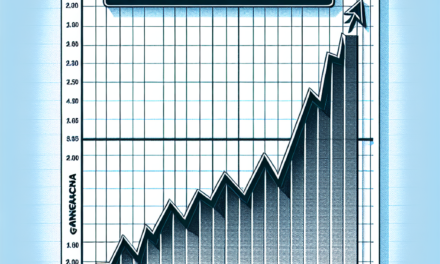“Vertiv’s Revenue Climbs High, But Market Sentiment Grounds Stock.”
Introduction
In the third quarter, Vertiv Holdings Co., a global provider of critical digital infrastructure and continuity solutions, reported a significant 19% increase in revenue, reflecting robust demand and operational efficiency. Despite this impressive financial performance, the company’s stock experienced a decline, puzzling investors and analysts alike. The drop in stock value suggests that market participants may have concerns about future growth prospects, potential macroeconomic challenges, or other underlying factors not immediately apparent in the revenue figures. This juxtaposition of strong revenue growth and declining stock price highlights the complexities of market dynamics and investor sentiment.
Analysis Of Vertiv’s Q3 Revenue Growth: Key Drivers Behind The 19% Increase
Vertiv’s third-quarter financial results have captured significant attention, with the company reporting a remarkable 19% increase in revenue. This impressive growth, however, was juxtaposed with a decline in its stock value, prompting a closer examination of the factors driving the revenue surge and the market’s reaction. Understanding the key drivers behind Vertiv’s revenue growth requires an exploration of the company’s strategic initiatives, market conditions, and operational efficiencies.
One of the primary contributors to Vertiv’s revenue increase is its strategic focus on expanding its product portfolio and enhancing its service offerings. Over the past year, Vertiv has invested heavily in research and development, leading to the introduction of innovative solutions that cater to the evolving needs of its customers. This commitment to innovation has enabled Vertiv to capture a larger market share, particularly in the data center infrastructure sector, where demand for reliable and efficient solutions continues to rise. As businesses increasingly rely on digital infrastructure, Vertiv’s ability to provide cutting-edge products has positioned it as a preferred partner for many organizations.
In addition to product innovation, Vertiv’s revenue growth can be attributed to its successful expansion into emerging markets. Recognizing the potential for growth in regions such as Asia-Pacific and Latin America, Vertiv has strategically increased its presence in these areas. By establishing local partnerships and tailoring its offerings to meet regional demands, the company has effectively tapped into new customer bases. This geographic diversification has not only contributed to revenue growth but also provided a buffer against economic fluctuations in more established markets.
Operational efficiencies have also played a crucial role in Vertiv’s financial performance. The company has implemented several cost-saving measures, including streamlining its supply chain and optimizing manufacturing processes. These efforts have resulted in improved profit margins, allowing Vertiv to reinvest in growth initiatives and further strengthen its competitive position. Moreover, the company’s focus on sustainability and energy efficiency has resonated with environmentally conscious customers, adding another layer of appeal to its offerings.
Despite these positive developments, the decline in Vertiv’s stock value suggests that investors may have concerns about the company’s future prospects. One possible explanation for this discrepancy is the broader market sentiment, which has been influenced by economic uncertainties and geopolitical tensions. Investors may be exercising caution, opting to wait for more stable conditions before committing to long-term investments. Additionally, some analysts have raised questions about Vertiv’s ability to sustain its current growth trajectory, particularly in light of potential supply chain disruptions and increased competition in the industry.
Furthermore, the stock market’s reaction could be a reflection of profit-taking behavior, where investors choose to capitalize on recent gains by selling shares. This phenomenon is not uncommon following a period of strong financial performance, as shareholders seek to lock in profits. While this may result in short-term stock price fluctuations, it does not necessarily indicate a lack of confidence in the company’s long-term potential.
In conclusion, Vertiv’s 19% revenue growth in the third quarter is a testament to its strategic initiatives, market expansion, and operational efficiencies. However, the decline in stock value highlights the complex interplay between financial performance and market perception. As Vertiv continues to navigate these dynamics, its ability to adapt to changing conditions and maintain its growth momentum will be critical in shaping its future trajectory.
Understanding The Market Reaction: Why Vertiv’s Stock Declined Despite Strong Revenue
Vertiv’s recent financial performance has been a topic of considerable interest, particularly given the company’s impressive 19% increase in third-quarter revenue. This growth, driven by robust demand for Vertiv’s data center infrastructure solutions, underscores the company’s strong market position and operational efficiency. However, despite these positive financial results, Vertiv’s stock experienced a decline, leaving many investors and market analysts puzzled. Understanding the market reaction requires a closer examination of the factors that may have contributed to this unexpected outcome.
To begin with, it is essential to recognize that stock prices are influenced by a multitude of factors beyond just revenue figures. While a 19% increase in revenue is undoubtedly a positive indicator of Vertiv’s business health, investors often look for a more comprehensive picture, including profitability, future growth prospects, and broader market conditions. In Vertiv’s case, although revenue surged, there may have been concerns about the company’s profit margins. If costs associated with production, supply chain, or other operational areas increased at a rate that outpaced revenue growth, it could have led to narrower profit margins, which might have dampened investor enthusiasm.
Moreover, market expectations play a crucial role in determining stock price movements. If investors had anticipated an even higher revenue growth or more substantial improvements in other financial metrics, the actual results, despite being strong, might have fallen short of these expectations. This phenomenon, often referred to as “priced-in expectations,” can lead to stock declines even when companies report positive earnings. In Vertiv’s case, the market may have already factored in the anticipated revenue growth, and any deviation from these expectations could have triggered a sell-off.
Additionally, external economic factors and market sentiment can significantly impact stock performance. The broader economic environment, including interest rates, inflation, and geopolitical tensions, can influence investor behavior. If investors are concerned about macroeconomic conditions, they may become more risk-averse, leading to a sell-off in stocks, including those of companies like Vertiv. Furthermore, sector-specific trends, such as shifts in technology demand or changes in regulatory landscapes, can also affect investor perceptions and stock valuations.
Another aspect to consider is the competitive landscape. Vertiv operates in a highly competitive industry, and any signs of increased competition or potential market share loss can weigh on investor sentiment. If competitors are perceived to be gaining ground or introducing innovative solutions that could challenge Vertiv’s market position, investors might react by adjusting their stock holdings accordingly.
Lastly, it is important to acknowledge that stock market reactions are not always rational or immediately reflective of a company’s intrinsic value. Short-term volatility can be driven by speculative trading, algorithmic models, or even psychological factors among investors. Therefore, while Vertiv’s stock decline following a strong revenue report may seem counterintuitive, it is not entirely uncommon in the financial markets.
In conclusion, Vertiv’s 19% increase in third-quarter revenue is a testament to the company’s operational strength and market demand for its solutions. However, the subsequent decline in its stock price highlights the complex interplay of factors that influence investor behavior. By considering elements such as profit margins, market expectations, economic conditions, competitive dynamics, and market sentiment, one can gain a more nuanced understanding of why Vertiv’s stock may have declined despite its robust financial performance.
Vertiv’s Strategic Moves In Q3: How They Contributed To Revenue Growth
In the third quarter of 2023, Vertiv Holdings Co. reported a remarkable 19% increase in revenue, a testament to the company’s strategic initiatives and robust market positioning. Despite this impressive financial performance, the company’s stock experienced a decline, a phenomenon that has intrigued investors and analysts alike. To understand the dynamics at play, it is essential to delve into the strategic moves that Vertiv implemented during this period, which significantly contributed to its revenue growth.
One of the pivotal strategies that Vertiv employed was the expansion of its product portfolio. By introducing innovative solutions tailored to meet the evolving demands of the data center and telecommunications industries, Vertiv successfully captured a larger market share. The company’s focus on developing energy-efficient and sustainable products resonated well with customers who are increasingly prioritizing environmental considerations. This alignment with market trends not only enhanced Vertiv’s competitive edge but also bolstered its revenue streams.
In addition to product innovation, Vertiv’s strategic acquisitions played a crucial role in driving revenue growth. By acquiring complementary businesses, Vertiv was able to broaden its service offerings and enter new markets. These acquisitions not only provided immediate revenue boosts but also positioned the company for long-term growth by enhancing its capabilities and expanding its customer base. The integration of these acquired entities was executed seamlessly, ensuring that the synergies were realized promptly and effectively.
Furthermore, Vertiv’s investment in digital transformation initiatives significantly contributed to its revenue growth in the third quarter. By leveraging advanced technologies such as artificial intelligence and the Internet of Things, Vertiv enhanced its operational efficiency and improved customer experiences. These digital advancements enabled the company to offer more value-added services, thereby increasing customer satisfaction and loyalty. As a result, Vertiv was able to secure repeat business and attract new clients, further driving its revenue upward.
Moreover, Vertiv’s strategic focus on expanding its global footprint cannot be overlooked. By strengthening its presence in high-growth regions such as Asia-Pacific and Latin America, the company tapped into new revenue streams and diversified its market exposure. This geographic expansion was supported by targeted marketing campaigns and strategic partnerships with local players, which facilitated market entry and accelerated growth. Consequently, Vertiv was able to capitalize on the increasing demand for data center infrastructure in these regions, contributing significantly to its overall revenue growth.
Despite these positive developments, the decline in Vertiv’s stock price suggests that investors may have concerns about the company’s future prospects. It is possible that market participants are wary of potential challenges such as supply chain disruptions, rising operational costs, or increased competition. Additionally, the broader economic environment, characterized by uncertainties and volatility, may have influenced investor sentiment, leading to a cautious approach towards Vertiv’s stock.
In conclusion, Vertiv’s strategic moves in the third quarter of 2023 were instrumental in achieving a 19% increase in revenue. Through product innovation, strategic acquisitions, digital transformation, and global expansion, the company strengthened its market position and enhanced its growth potential. However, the decline in stock price indicates that investors may be adopting a wait-and-see approach, reflecting broader market concerns. As Vertiv continues to navigate these challenges, its ability to sustain revenue growth while addressing investor apprehensions will be crucial in shaping its future trajectory.
Investor Sentiment And Vertiv’s Stock Performance: A Closer Look

Vertiv’s recent financial performance has been a topic of considerable interest among investors and analysts alike. The company, known for its critical digital infrastructure and continuity solutions, reported a remarkable 19% increase in revenue for the third quarter. This impressive growth is indicative of Vertiv’s robust market position and its ability to capitalize on the increasing demand for data center solutions. However, despite this positive financial news, Vertiv’s stock experienced a decline, prompting a closer examination of investor sentiment and the factors influencing the company’s stock performance.
To begin with, the 19% revenue surge in Q3 can be attributed to several key factors. Vertiv has successfully expanded its product offerings and enhanced its service capabilities, allowing it to meet the evolving needs of its clients. The global shift towards digitalization and the growing reliance on cloud computing have further fueled demand for Vertiv’s solutions. Additionally, strategic acquisitions and partnerships have bolstered the company’s market presence, enabling it to capture a larger share of the industry. These efforts have not only driven revenue growth but have also positioned Vertiv as a leader in the digital infrastructure sector.
Despite these positive developments, the decline in Vertiv’s stock price suggests that investors may have concerns that extend beyond the company’s immediate financial performance. One possible explanation for this discrepancy is the broader market environment. Economic uncertainties, such as inflationary pressures and geopolitical tensions, have created a volatile backdrop for stocks in general. Investors may be exercising caution, opting to reassess their portfolios in light of these external factors. Consequently, even companies with strong financial results, like Vertiv, may experience stock price fluctuations as part of this broader market trend.
Moreover, investor sentiment can be influenced by expectations for future performance. While Vertiv’s Q3 results were impressive, some investors may be questioning the sustainability of this growth trajectory. The technology sector is highly competitive, and maintaining a leading position requires continuous innovation and adaptation. Investors may be scrutinizing Vertiv’s long-term strategy, assessing whether the company can sustain its growth momentum in the face of potential challenges such as supply chain disruptions or increased competition.
Another factor that could be impacting investor sentiment is the company’s valuation. As Vertiv’s stock price rose in anticipation of strong financial results, it is possible that the market had already priced in the positive news. When the actual results were announced, the stock may have experienced a “sell the news” reaction, where investors took profits, leading to a decline in the stock price. This phenomenon is not uncommon in the stock market and can occur even when a company’s performance meets or exceeds expectations.
In conclusion, while Vertiv’s Q3 revenue growth of 19% is a testament to its strong market position and strategic initiatives, the decline in its stock price highlights the complex interplay of factors influencing investor sentiment. Broader market conditions, future growth expectations, and valuation considerations all play a role in shaping how investors perceive and react to a company’s financial performance. As Vertiv continues to navigate these dynamics, it will be crucial for the company to effectively communicate its long-term strategy and address any potential concerns to maintain investor confidence and support its stock performance.
Comparing Vertiv’s Q3 Performance With Industry Peers
In the third quarter of 2023, Vertiv Holdings Co. reported a remarkable 19% increase in revenue, a testament to its robust operational strategies and market demand for its products and services. Despite this impressive financial performance, the company’s stock experienced a decline, a phenomenon that has puzzled investors and analysts alike. To better understand this paradox, it is essential to compare Vertiv’s performance with that of its industry peers, examining the broader market dynamics and investor sentiment that may have influenced these outcomes.
Vertiv, a global provider of critical digital infrastructure and continuity solutions, has consistently demonstrated its ability to adapt to the rapidly evolving technological landscape. The company’s Q3 revenue growth can be attributed to its strategic focus on expanding its product portfolio and enhancing its service offerings. This approach has enabled Vertiv to capture a larger share of the market, particularly in sectors such as data centers, telecommunications, and industrial applications. However, when juxtaposed with its industry peers, Vertiv’s stock performance presents a more complex picture.
In comparison, other companies within the same sector have also reported strong financial results, driven by similar market trends. For instance, Schneider Electric and Eaton Corporation, both key players in the electrical equipment industry, have also experienced revenue growth in recent quarters. These companies have benefited from the increasing demand for energy-efficient solutions and the ongoing digital transformation across various industries. Nevertheless, their stock performances have not mirrored the same decline observed in Vertiv’s case, suggesting that other factors may be at play.
One possible explanation for the discrepancy between Vertiv’s revenue growth and its stock decline could be investor expectations. In the current economic climate, characterized by inflationary pressures and geopolitical uncertainties, investors may be more cautious and selective in their investment choices. As a result, even companies with strong financial performances may face stock volatility if their results do not exceed market expectations or if there are concerns about future growth prospects. In Vertiv’s case, while the 19% revenue increase is commendable, it may not have been sufficient to assuage investor concerns about potential headwinds, such as supply chain disruptions or increased competition.
Furthermore, the broader market sentiment towards the technology and infrastructure sectors may have also played a role in Vertiv’s stock decline. As interest rates rise and economic conditions fluctuate, investors may be reallocating their portfolios, favoring sectors perceived as more stable or less susceptible to market volatility. This shift in investment strategy could have contributed to the downward pressure on Vertiv’s stock, despite its strong quarterly performance.
In conclusion, while Vertiv’s Q3 revenue growth of 19% underscores its operational strength and market relevance, the decline in its stock price highlights the complex interplay of factors influencing investor sentiment and market dynamics. By comparing Vertiv’s performance with that of its industry peers, it becomes evident that broader economic conditions, investor expectations, and sector-specific trends all contribute to shaping stock market outcomes. As Vertiv continues to navigate these challenges, its ability to sustain growth and address investor concerns will be crucial in determining its future market performance.
Future Outlook For Vertiv: Can The Revenue Momentum Be Sustained?
Vertiv’s recent financial performance has captured the attention of investors and industry analysts alike, as the company reported a remarkable 19% increase in revenue for the third quarter. This impressive growth underscores Vertiv’s robust market position and its ability to capitalize on the increasing demand for data center infrastructure solutions. However, despite this positive revenue trajectory, Vertiv’s stock experienced a decline, prompting questions about the sustainability of its current momentum and the factors influencing investor sentiment.
To understand the future outlook for Vertiv, it is essential to examine the underlying drivers of its recent revenue growth. The surge can be attributed to several key factors, including the global expansion of data centers, the proliferation of cloud computing, and the increasing reliance on digital infrastructure. As businesses continue to digitize their operations and consumers demand more data-driven services, the need for reliable and efficient data center solutions has never been greater. Vertiv, with its comprehensive portfolio of products and services, is well-positioned to meet this demand, providing critical infrastructure that ensures the seamless operation of data centers worldwide.
Moreover, Vertiv’s strategic initiatives have played a significant role in bolstering its revenue. The company has made concerted efforts to expand its global footprint, enhance its product offerings, and invest in innovative technologies. By focusing on emerging markets and strengthening its presence in key regions, Vertiv has been able to capture new opportunities and drive growth. Additionally, the company’s commitment to research and development has enabled it to introduce cutting-edge solutions that address the evolving needs of its customers, further solidifying its competitive edge.
Despite these positive developments, the decline in Vertiv’s stock suggests that investors may have concerns about the company’s ability to sustain its growth trajectory. One potential factor contributing to this apprehension is the broader economic environment. With ongoing uncertainties in the global economy, including inflationary pressures and supply chain disruptions, investors may be wary of potential headwinds that could impact Vertiv’s future performance. Furthermore, the competitive landscape in the data center infrastructure sector is intensifying, with numerous players vying for market share. This heightened competition could pose challenges for Vertiv as it seeks to maintain its leadership position.
In light of these considerations, Vertiv’s management must continue to execute its strategic vision effectively to sustain its revenue momentum. This includes maintaining a focus on innovation, optimizing operational efficiencies, and strengthening customer relationships. By doing so, Vertiv can not only navigate potential challenges but also capitalize on emerging opportunities in the rapidly evolving digital landscape.
Looking ahead, the future outlook for Vertiv remains promising, provided the company can adapt to changing market dynamics and continue to deliver value to its stakeholders. The demand for data center infrastructure is expected to grow as digital transformation accelerates across industries. Vertiv’s ability to leverage its expertise and resources will be crucial in capturing this demand and driving sustained growth. While the recent stock decline may raise questions, it is important to recognize the underlying strength of Vertiv’s business model and its potential for long-term success. As the company continues to innovate and expand its reach, it is well-positioned to thrive in the ever-evolving digital economy.
Financial Health Of Vertiv: Beyond The Q3 Revenue Numbers
In the third quarter of 2023, Vertiv Holdings Co. reported a remarkable 19% increase in revenue, a testament to the company’s robust operational strategies and market demand for its products and services. This impressive growth, however, was overshadowed by a decline in the company’s stock, prompting investors and analysts to delve deeper into the financial health of the organization beyond the headline revenue figures. Understanding the dynamics at play requires a comprehensive analysis of Vertiv’s financial performance, market conditions, and investor sentiment.
To begin with, Vertiv’s revenue surge can be attributed to several key factors. The company has successfully capitalized on the growing demand for data center infrastructure, driven by the global expansion of cloud computing and digital transformation initiatives. Vertiv’s strategic investments in innovation and its ability to deliver high-quality, reliable solutions have positioned it as a leader in the industry. Furthermore, the company’s global footprint and diversified product portfolio have enabled it to capture market share across different regions and customer segments.
Despite these positive developments, the decline in Vertiv’s stock suggests that investors are concerned about other aspects of the company’s financial health. One potential area of concern is the company’s profit margins. While revenue growth is a positive indicator, it is crucial to assess whether this growth translates into improved profitability. Rising operational costs, supply chain disruptions, and inflationary pressures could potentially erode profit margins, thereby impacting the company’s bottom line. Investors may be wary of these challenges and their potential impact on future earnings.
Additionally, Vertiv’s financial health must be evaluated in the context of its balance sheet and cash flow position. A strong balance sheet with manageable levels of debt and healthy cash reserves is essential for sustaining growth and weathering economic uncertainties. Investors may be scrutinizing Vertiv’s debt levels and its ability to generate free cash flow, which are critical indicators of financial stability and flexibility. Any perceived weaknesses in these areas could contribute to the decline in stock value, as investors seek assurance that the company can maintain its growth trajectory without compromising financial health.
Moreover, broader market conditions and investor sentiment play a significant role in stock performance. The technology sector, in particular, has experienced heightened volatility due to macroeconomic factors such as interest rate fluctuations, geopolitical tensions, and regulatory changes. These external factors can influence investor confidence and lead to stock price fluctuations, even for companies with strong revenue growth like Vertiv. It is essential to consider these external influences when assessing the reasons behind the stock decline.
In conclusion, while Vertiv’s 19% increase in Q3 revenue is a commendable achievement, a comprehensive evaluation of the company’s financial health requires a deeper analysis of profit margins, balance sheet strength, and cash flow generation. Investors are likely weighing these factors alongside broader market conditions and external influences. As Vertiv continues to navigate the complexities of the technology sector, maintaining a focus on operational efficiency, cost management, and strategic investments will be crucial for sustaining growth and enhancing investor confidence. By addressing these areas, Vertiv can work towards aligning its stock performance with its impressive revenue growth, ultimately reinforcing its position as a leader in the data center infrastructure market.
Q&A
1. **What was Vertiv’s revenue growth in Q3?**
Vertiv’s revenue grew by 19% in Q3.
2. **How did Vertiv’s stock react to the Q3 revenue report?**
Despite the revenue growth, Vertiv’s stock declined.
3. **What might be a reason for the stock decline despite revenue growth?**
Potential reasons could include profit margins, future guidance, or broader market conditions.
4. **Did Vertiv meet or exceed analysts’ expectations for Q3?**
This would depend on specific analyst forecasts, which are not provided here.
5. **What sector does Vertiv operate in?**
Vertiv operates in the data center infrastructure sector.
6. **What are some key products or services offered by Vertiv?**
Vertiv offers power management, thermal management, and IT infrastructure solutions.
7. **What could investors be concerned about despite the revenue increase?**
Investors might be concerned about profitability, cost management, or economic outlook.
Conclusion
Vertiv’s Q3 revenue increase of 19% indicates strong business performance and growth, likely driven by effective strategies and market demand. However, the decline in stock price suggests that investors may have concerns beyond revenue figures, such as profit margins, future guidance, or broader market conditions. This discrepancy highlights the complexity of stock market reactions, where positive financial results do not always translate to immediate investor confidence.





